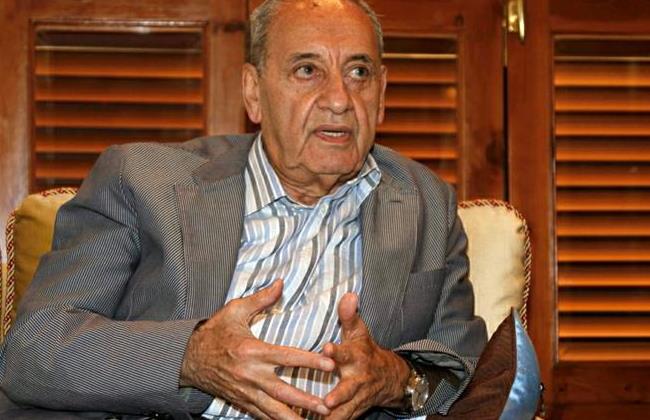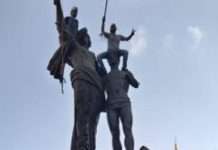Hezbollah, Future make headway easing tension
Hussein Dakroub/The Daily Star/Jan. 06, 2015
BEIRUT: The Future Movement and Hezbollah made “serious progress” Monday in a second round of talks to defuse sectarian tensions exacerbated by the conflict in Syria, officials from the two rival factions said. The two sides also agreed to continue the implementation of a government security plan in all Lebanese territories following the successful restoration of state authority in the northern city of Tripoli.
Discussions between senior officials from the Future Movement and Hezbollah centered on a main item: defusing sectarian tensions, according to an official statement issued following a four-hour meeting hosted by Speaker Nabih Berri at his Ain al-Tineh residence. “Serious progress has been made in this respect [defusing sectarian tensions],” the terse statement said. It added that the two sides also agreed to support the continued implementation of a security plan in all Lebanese territories. The Lebanese Army last year heavily deployed in Tripoli, crushing Islamist militants in line with a security plan to restore law and order to the city torn by sectarian fighting between supporters and opponents of Syrian President Bashar Assad.
Following the Army deployment in Tripoli, there have been calls mainly by Future and March 14 allies for the security plan to be enforced also in the Bekaa Valley region, long plagued by kidnappings for ransom, killings, vendettas, drug smuggling and car thefts. Hezbollah enjoys wide popular support in the Bekaa Valley, especially in areas near the border with Syria. The Shiite party has been accused by the March 14 coalition of preventing the Army from asserting government control over these areas. The statement did not say what measures Future and Hezbollah would take to ease political and sectarian tensions, which had in the past flared up into street violence between supporters of the two sides.
Berri, the sponsor of the Future-Hezbollah dialogue, did not attend Monday’s session. He was represented by his political aide, Finance Minister Ali Hasan Khalil. As in the first session held at Ain al-Tineh on Dec. 23, the Future Movement was represented by Nader Hariri, chief of former Prime Minister Saad Hariri’s staff, Interior Minister Nouhad Machnouk and MP Samir Jisr.
Hezbollah was represented by Hussein Khalil, a political aide to Hezbollah leader Sayyed Hasan Nasrallah, Industry Minister Hussein Hajj Hasan and MP Hasan Fadlallah.
Monday’s was the second session of a dialogue launched last month with the aim of easing Sunni-Shiite tensions and facilitating the election of a new president. Defusing Sunni-Shiite tensions is the main item on the dialogue agenda which, according to officials from both sides, also includes finding a mechanism to allow the election of a president, boosting efforts to combat terrorism, promoting a new electoral law and energizing stagnant state institutions.
Last month’s meeting was the first face-to-face encounter between Future and Hezbollah officials in four years since the Hezbollah-led March 8 alliance toppled Hariri’s national unity government in January 2011.
Prime Minister Tammam Salam as well as Future MPs and rival politicians have voiced hopes that the Future-Hezbollah dialogue would help break the 7-month-old presidential deadlock.
In addition to gaining support from rival politicians, the Future-Hezbollah dialogue has also won backing from Egypt as well as the U.S., Saudi and Iranian ambassadors in Beirut.
The dialogue was also praised by the European Union. “The European Union welcomes the dialogue between Hezbollah and the Future Movement,” EU Ambassador to Lebanon Angelina Eichhorst told reporters after meeting Berri at Ain al-Tineh. “This dialogue sends a good signal to the Lebanese people and the region that differences can be overcome.”
She said she congratulated Berri for his efforts to get the two rival parties talking to each other. “It is a good beginning for the New Year with the convening of the second session of this dialogue which is a subject of interest for everyone with regard to overcoming differences among the Lebanese parties,” Eichhorst said. Machnouk sounded optimistic about the outcome of the Future-Hezbollah dialogue.
“Our main goal is to defuse Sunni-Shiite tensions and later discuss the presidency,” he told reporters after meeting Grand Mufti Sheikh Abdel-Latif Derian at Dar-Fatwa hours before heading for the talks with Hezbollah officials. “We are still at the beginning and let’s wait. We are always optimistic.”
A senior Hezbollah official said dialogue must be upheld by Sunnis and Shiites in order to ward off the threat of sectarian strife hanging over the country as a result of the repercussions of the war in Syria.
“The gate of dialogue must remain open among Muslims in order to snuff out the fire of strife and raise hope,” Sayyed Ibrahim Amin al-Sayyed, head of Hezbollah’s Political Council, said at a dinner hosted by the party at a restaurant south of Beirut on the occasion of Prophet Mohammad’s birthday.
Separately, Nasrallah will tackle local and regional issues in a televised speech Friday marking Prophet Mohammad’s birthday, Al-Manar TV station reported Monday. It said Nasrallah’s speech, likely to touch on the dialogue between Hezbollah and the Future Movement, would be aired during a Hezbollah-sponsored rally at Mahdi school in the southern Beirut suburb of Hadath at 2:30 p.m














